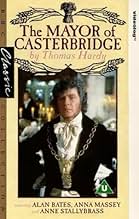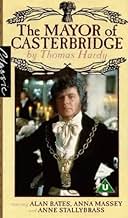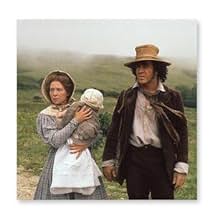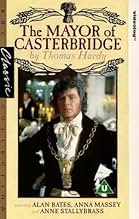Drunken Henchard sells wife at fair. Sober, he reforms, becomes mayor but past catches up when wife returns years later.Drunken Henchard sells wife at fair. Sober, he reforms, becomes mayor but past catches up when wife returns years later.Drunken Henchard sells wife at fair. Sober, he reforms, becomes mayor but past catches up when wife returns years later.
Browse episodes
Featured reviews
A thoughtful TV production, running over six hours, and a fine adaptation of Thomas Hardy's novel, arguably his best Wessex tale. Casterbridge stands for the real-life Oxford, a town where dreams can happen and a man such as Michael Henchard can rise as high as man can climb, and fall as far as man can sink. He is a tragic hero, a towering tour-de-force of good and evil, fearlessness and folly, and is beautifully played by Alan Bates in this version.
In support, Anne Stallybrass and Anna Massey shine the most, with Jack Galloway going some way to give life to the dour and ambitious Scot Farfrae, but stopping short of illuminating his complexities as set out in the book.
The music and the settings of this adaptation are excellent, and the atmosphere of a farm town, not yet touched by anything beyond industrialisation, is richly drawn. Slow-paced, but satisfying, this drama's reputation has grown steadily, and it is well deserved.
Interestingly, the adaptor of Hardy's book is none other than TV's infant terrible, Dennis Potter, and it is interesting to compare 'The Mayor of Casterbridge' with the likes of 'Pennies from Heaven' or 'The Singing Detective'.
In support, Anne Stallybrass and Anna Massey shine the most, with Jack Galloway going some way to give life to the dour and ambitious Scot Farfrae, but stopping short of illuminating his complexities as set out in the book.
The music and the settings of this adaptation are excellent, and the atmosphere of a farm town, not yet touched by anything beyond industrialisation, is richly drawn. Slow-paced, but satisfying, this drama's reputation has grown steadily, and it is well deserved.
Interestingly, the adaptor of Hardy's book is none other than TV's infant terrible, Dennis Potter, and it is interesting to compare 'The Mayor of Casterbridge' with the likes of 'Pennies from Heaven' or 'The Singing Detective'.
'Casterbridge' is Dorchester, not Oxford. You can still stand in the street in Dorchester where Michael Henchard's wife stood, opposite the hotel where he was holding court as the mayor.
Two lines stand out from this memorable movie, lines for which I suppose Thomas Hardy must take most of the credit.
Henchard's first words on meeting his wife after twenty years: 'I don't drink.'
And his wife's explanation, when speaking of the man who had bid five guineas for her and her baby at the fairground auction: 'I couldn't leave him, Michael. Not after he'd paid all that money for me.'
(Both quotes from memory, but I think they are accurate.)
Two lines stand out from this memorable movie, lines for which I suppose Thomas Hardy must take most of the credit.
Henchard's first words on meeting his wife after twenty years: 'I don't drink.'
And his wife's explanation, when speaking of the man who had bid five guineas for her and her baby at the fairground auction: 'I couldn't leave him, Michael. Not after he'd paid all that money for me.'
(Both quotes from memory, but I think they are accurate.)
10stancym
10 is not a high enough rating for this masterpiece. Even as we see the gorgeous and extremely talented Alan Bates as the mayor, making mistake after mistake, acting like a fool, struggling with his conscience, and sometimes making things right only to screw up again, we are moved by him. We have pity for a man who cannot get out of his own way, who is his own worst enemy.
The acting is superb, the scenery/sets beautiful and fitting of the time and place. Often meanings are conveyed through looks, expressions, and not an excess of words. The score by Carl Davis is appropriate and adds to the feel of the series, enhancing the whole thing.
What luck that this is on DVD, complete with biographies on Sir Alan Bates and Thomas Hardy, among other things. Don't miss this gem.
The acting is superb, the scenery/sets beautiful and fitting of the time and place. Often meanings are conveyed through looks, expressions, and not an excess of words. The score by Carl Davis is appropriate and adds to the feel of the series, enhancing the whole thing.
What luck that this is on DVD, complete with biographies on Sir Alan Bates and Thomas Hardy, among other things. Don't miss this gem.
The Mayor of Casterbridge is a wonderful story, maybe not the most accessible of his work but bleak but compelling and poignant. This 1978 series is superb. The photography is skillful, while the costumes and sets are both beautiful and bleakily atmospheric. The music conveys an appropriately evocative mood, while the story while unfolding at a deliberate slow pace is still moving and the script sophisticated, thoughtful and faithful in spirit to Hardy's work. The performances are just as impressive, whether in the facial expressions or the nuanced accents, with Alan Bates embodying Henchard's character to perfection. In support Anne Stallybrass and Anna Massey fare best in portrayals just as moving and well-realised. Janet Maw is also great. Jack Galloway is not quite as good, he is suitably dour but his character here is not as complex.
All in all, superb series and highly recommended. 10/10 Bethany Cox
All in all, superb series and highly recommended. 10/10 Bethany Cox
This grim BBC miniseries is hard on ears belonging to non-British viewers who aren't already familiar with the Thomas Hardy source novel, so thick are the regional accents, so muffled is the soundtrack, and so lackadaisically introduced are some of the plot developments. Whether you can understand all of his utterances or not, Alan Bates gives a robust performance in the lead, his second foray into Hardy territory, several years after his incarnation as sheep farmer Gabriel Oak in John Schlesinger's "Far from the Madding Crowd." Henchard is far less appealing than Oak and it's difficult to warm to such a man although you can respect him for rising from the mess he makes of his youth to prominence and commercial success in middle age. Bates barks most of his lines as if to emphasize his character's simplicity and lack of finesse. His outbursts of rage and drunken excess are brilliantly effective. There is nothing likable about him but we can empathize with his plight, that of an ordinary man with strengths and weaknesses who was unlucky enough to make a major mistake early in life that eventually overshadowed all that was to come.
This adaptation by Dennis Potter takes some liberties with the twisty, coincidence-laden plot, and not always to good effect, though it's hard to tell how much was written out as opposed to how much was cut after shooting. The casting of supporting roles is apt; these are not glamorous people, but ordinary rural folk of the mid-19th century, and all of the actors who play these roles fully bring their homely characters to convincing and persuasive life, aided by the liberal use of closeups and long takes. Jack Galloway is particularly impressive as goodhearted, trusting Donald Farfrae, the Scotsman who is forcefully befriended by Henchard, only to become his undoing. Strangely, the germination and blossoming of their relationship, so clearly laid out in the novel, is skipped and introduced full-blown like an afterthought, which not only removes the fatalistic element but becomes another of several inexplicable plot shifts that viewers must accept as a given. The piling up of these arbitrary developments weaken the presentation. Like Schlesinger's "Crowd" before it, the physical production convincingly replicates the era in question, down to costume and furnishings and the population of grizzled locals seen at pubs and markets and stables. Interiors look like they were shot in the actual cramped, underlit, claustrophobic dwellings the characters inhabited. Carl Davis's somber, spare score complements the tone without getting in the way.
A boom mike is clearly visible in one parlor scene and shadows of booms appear occasionally in other scenes. At times characters run over each other's lines in a way that mimics actual non-rehearsed speech but could also be gaffes that were left intact due to budget or schedule concerns. On the whole it looks like a modestly financed production whose every penny was wisely invested in the period furnishings and costumes. Good use is made of the melancholy, windswept countryside.
This adaptation by Dennis Potter takes some liberties with the twisty, coincidence-laden plot, and not always to good effect, though it's hard to tell how much was written out as opposed to how much was cut after shooting. The casting of supporting roles is apt; these are not glamorous people, but ordinary rural folk of the mid-19th century, and all of the actors who play these roles fully bring their homely characters to convincing and persuasive life, aided by the liberal use of closeups and long takes. Jack Galloway is particularly impressive as goodhearted, trusting Donald Farfrae, the Scotsman who is forcefully befriended by Henchard, only to become his undoing. Strangely, the germination and blossoming of their relationship, so clearly laid out in the novel, is skipped and introduced full-blown like an afterthought, which not only removes the fatalistic element but becomes another of several inexplicable plot shifts that viewers must accept as a given. The piling up of these arbitrary developments weaken the presentation. Like Schlesinger's "Crowd" before it, the physical production convincingly replicates the era in question, down to costume and furnishings and the population of grizzled locals seen at pubs and markets and stables. Interiors look like they were shot in the actual cramped, underlit, claustrophobic dwellings the characters inhabited. Carl Davis's somber, spare score complements the tone without getting in the way.
A boom mike is clearly visible in one parlor scene and shadows of booms appear occasionally in other scenes. At times characters run over each other's lines in a way that mimics actual non-rehearsed speech but could also be gaffes that were left intact due to budget or schedule concerns. On the whole it looks like a modestly financed production whose every penny was wisely invested in the period furnishings and costumes. Good use is made of the melancholy, windswept countryside.
Did you know
- TriviaThis was one of the first major British television dramas to be shot entirely on videotape, using the new generation of portable video cameras and equipment for location footage. However, it was by no means the first BBC drama to do this, as series such as Docteur Who (1963) and Survivors (1975) had already used video for location footage as early as 1974-75.
- ConnectionsEdited into Masterpiece Theatre: The Mayor of Casterbridge: Part 1 (1978)
- How many seasons does The Mayor of Casterbridge have?Powered by Alexa
Details
Contribute to this page
Suggest an edit or add missing content





































